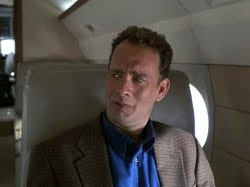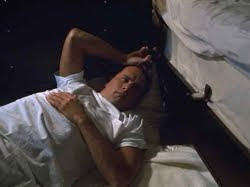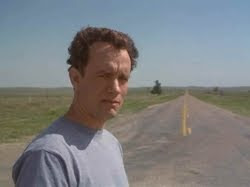Stage 1, Call to Adventure = Turbulence wakes Chuck Noland, who is sleeping on a FedEx planeOne advantage of using Cast Away to teach the hero cycle is that the third portion of the adventure gets a detailed treatment. My students and I decided that Chuck Noland met all the required stages of return.
Stage 2, Refusal of the Call = Noland, denying that the plane is in trouble, goes to the bathroom to wash his face
Stage 3, Supernatural Aid and Amulet = Albert Miller, a pilot, shoves a life raft into Noland's arms
Stage 4, Crossing of the First Threshold = With the help of the life raft, Noland makes it to the surface of the water, his old life sinking with the plane
Stage 5, Belly of the Whale = Noland reaches the deserted island, where he initially has no skills
Stage 6, Road of Trials = Despite the primitive conditions, Noland acquires basic necessities of life: food, shelter, water, companionship
Stage 7, Meeting with the Goddess = The Woman of the Golden Wings makes her appearance as a Port-O-Let, giving Noland the idea to leave the island
Stage 8, Woman as Temptress = Wife-like Wilson brings up his concerns about the dangers of leaving, tempting Noland to stay
Stage 9, Atonement with the Father = Noland sends himself off as a package, not knowing when, where, or if he will ever arrive, submitting to the mysteries of Father Time
Stage 10, Apotheosis, and Stage 11, The Ultimate Boon = Noland, powerful with his aluminum wings, flies over the breakers fencing the island and easily escapes
Refusal of the Return: For this stage, my students and I disagreed. I will admit that they made a very strong argument for their case. I have always thought that Noland's refusal was the ease with which he adapts to life on the raft, illustrating his need for "no land" beneath his feet. We see him collect water during a storm and spear fish as he swims nearby. He is able to meet all of his basic needs, just as he did on the island, and I believe that his contentment and ease, his lack of impatience for an immediate rescue, fulfill this stage.
My students, on the other hand, thought that Noland refuses the return when Wilson falls off the raft and floats away. At this later point in life on the ocean, Noland is exhausted; he has lost his sail and the raft is disintegrating. When he discovers that Wilson is bobbing in the water far from the raft, he starts swimming to retrieve him but realizes that he doesn't have the strength. My students argued that if he had continued, he would have drowned, refusing the return in a definitive way. By choosing the relative safety of the raft over Wilson, he allowed the cycle to continue.
Since the stages of return must follow a certain order, the decision to lose Wilson to stay with the raft comes too late for me—other later stages have been met before this scene. But my students, clever people that they are, were still able to work out the rest of the cycle, as you will see.
 Magical Flight: Powerful forces, according to Joseph Campbell, either help or hinder the hero's return home. Since I have equated the Woman of the Golden Wings with Athena to Noland's Odysseus, I believe that Noland is hindered when his Athena, represented by the Port-O-Let sail, flaps off into the night during a storm. She helps him off the island but thwarts him on the road back to his old life. Since this scene occurs before the loss of Wilson, the volleyball floating off on strong currents couldn't be, for me, the refusal of return.
Magical Flight: Powerful forces, according to Joseph Campbell, either help or hinder the hero's return home. Since I have equated the Woman of the Golden Wings with Athena to Noland's Odysseus, I believe that Noland is hindered when his Athena, represented by the Port-O-Let sail, flaps off into the night during a storm. She helps him off the island but thwarts him on the road back to his old life. Since this scene occurs before the loss of Wilson, the volleyball floating off on strong currents couldn't be, for me, the refusal of return.My students argued that Noland's magical flight was instead the whale. Whereas I saw the whale only once in the movie, that one star-lit night early in the voyage home, my students believed that the whale had been following the raft ever since. They claimed that water spray was the proof. When Noland first encountered the behemoth, they explained, he was woken by spray. Since he was alerted by similar spray when Wilson fell off the raft, and then again as the ship that rescued him passed behind his back, my students argued that the whale had been watching over him in a protective manner ever since that first night.
 Rescue from Without: No one disagreed that Kelly is Noland's call from his old life, the next stage in the cycle. We did have a laugh because a number of students couldn't understand why, when Noland finally sees the freighter, he is hoarsely calling out "Kill me. Kill me." Why, they asked, would he want to die this close to home? Those of us who had ears unruined by constant iPod music clarified that he was saying, "Kelly. Kelly."
Rescue from Without: No one disagreed that Kelly is Noland's call from his old life, the next stage in the cycle. We did have a laugh because a number of students couldn't understand why, when Noland finally sees the freighter, he is hoarsely calling out "Kill me. Kill me." Why, they asked, would he want to die this close to home? Those of us who had ears unruined by constant iPod music clarified that he was saying, "Kelly. Kelly." Crossing of the Return Threshold: Again, this stage caused some minor disagreement. The appearance of the freighter, Noland's first sight of civilization in four years, full of packages as was his old life, is the crossing for me. My students wanted to wait until he was back on the plane with his buddy Stan, flying to the FedEx festivities. Either way, he transitions back to his modern life.
Crossing of the Return Threshold: Again, this stage caused some minor disagreement. The appearance of the freighter, Noland's first sight of civilization in four years, full of packages as was his old life, is the crossing for me. My students wanted to wait until he was back on the plane with his buddy Stan, flying to the FedEx festivities. Either way, he transitions back to his modern life. Master of Two Worlds: As a result of the adventure, the hero acquires skills that allow him to live more fully in his old life and have confidence to venture into the Unknown in the future. The best depiction of Noland's mastery occurs in his hotel room after his friends leave. He picks up a crab leg; he plays with a lighter; he sleeps on the floor. We know that he will be able to eat in a civilized manner at Red Lobster, that he will use the thermostat in his home and the buttons on his stove to control heat, that eventually he will sleep in a bed. Unlike a character in a Jack London story, he hasn't gone crazy during his years of deprivation. But we also know that if he has to spear fish with a sharpened stick, make fire with his bare hands, or get comfortable in a stone cave, that he retains those skills as well. And more importantly, we know that the confidence he has in his abilities to survive dramatically different environments will give him an edge whenever problems arise in his modern life.
Master of Two Worlds: As a result of the adventure, the hero acquires skills that allow him to live more fully in his old life and have confidence to venture into the Unknown in the future. The best depiction of Noland's mastery occurs in his hotel room after his friends leave. He picks up a crab leg; he plays with a lighter; he sleeps on the floor. We know that he will be able to eat in a civilized manner at Red Lobster, that he will use the thermostat in his home and the buttons on his stove to control heat, that eventually he will sleep in a bed. Unlike a character in a Jack London story, he hasn't gone crazy during his years of deprivation. But we also know that if he has to spear fish with a sharpened stick, make fire with his bare hands, or get comfortable in a stone cave, that he retains those skills as well. And more importantly, we know that the confidence he has in his abilities to survive dramatically different environments will give him an edge whenever problems arise in his modern life. Freedom to Live: By modern standards, the pre-crash Chuck Noland was a successful man. He commanded workers below him, jetting around the world insuring the interests of a huge corporation. But he was a slave to time and predictability. At the end of the movie, when he stands in the crossroads without a plan, willing to go not where a schedule dictates but where the moment carries him, then we know that he has true freedom to live.
Freedom to Live: By modern standards, the pre-crash Chuck Noland was a successful man. He commanded workers below him, jetting around the world insuring the interests of a huge corporation. But he was a slave to time and predictability. At the end of the movie, when he stands in the crossroads without a plan, willing to go not where a schedule dictates but where the moment carries him, then we know that he has true freedom to live.My students were not unhappy that he loses Kelly. One young man, when Kelly's husband explains that she is unwilling to meet Noland, said, "I'd have beaten the shit out of him." But by the end of the movie, they agreed that his old life was a trap. They thought the artist was beautiful and cheered his decision to pursue her. I believe that they got the hero cycle.


